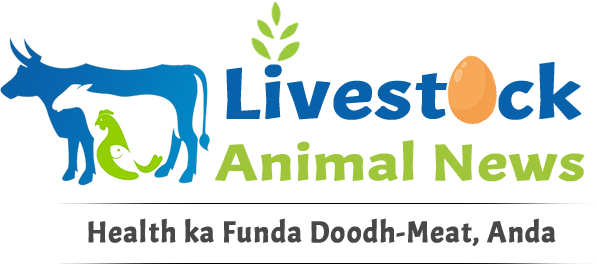New Delhi. The details of Standard Operating Procedure (SOP) in the event of an outbreak of diseases are as follows; Department of Animal Husbandry& Dairying has formulated and circulated the National Action Plans (NAPs) for identification and notification of the affected area, isolation of affected animals and implementation of biosecurity measures, restriction on movement of livestock etc. to undertake the control measures during disease outbreak
The Crisis Management Plan (CMP) has been developed for Livestock diseases in managing and responding to animal disease outbreaks, ensuring swift containment and mitigation.
‘Standard Veterinary Treatment Guidelines (SVTGs) has been formulated by the Department for best practices in veterinary care to enhance livestock health and disease control.
Department provides financial support to all States and Union Territories including Regional Disease Diagnostic Laboratories and laboratories of Indian Council of Agricultural Research under Livestock Health Disease Control programme (LHDCP) scheme for sero-surveillance, sero-monitoring, training and capacity building.
State-wise sampling plan has been prepared and 100% Central assistance is provided to Indian Council of Agricultural Institutes (ICAR) like ICAR-NIFMD Bhubaneswar, ICAR-IVRI, Bengaluru and ICAR – NIVEDI, Bengaluru for carrying out sero-surveillance, sero-monitoring including confirmation of doubtful cases, training of laboratory personnel and other related activities. Accordingly regular sero-surveillance is being done on diseases covered under National Disease Control Programme (NADCP).
Department under LHDCP scheme provides financial support to States/UTs for establishment and strengthening of diagnostic infrastructure including “Continuing Veterinary Education (CVE)” to enhance skills & knowledge of the Veterinarians and Para Veterinarians. Department under Establishment and Strengthening of Veterinary Hospitals and Dispensaries-Mobile Veterinary Units (ESVHD-MVU), of LHDCP scheme provides financial support to the States/UTs for operation of Mobile Veterinary Units (MVUs) to provide diagnosis, treatment at farmer’s doorstep. Presently, 4016 MVUs are operationalised across the country in 28 states.
Further, under Assistance to States for Control of Animal Disease (ASCAD) support is provided to State Biological Production Units (BPUs) for supplementing production of disease diagnostic kits/vaccines. Also 100% financial assistance is provided to States/UTs for activities under” Research & Innovation, publicity & awareness training and allied activities.
The success rate of Artificial Insemination in the country is ranging from 32%-35% as per data reported by the States on Bharat Pashudhan portal. The following steps, in the form of technological advancements, scientific interventions and policy initiatives have been undertaken by the Department of Animal Husbandry and Dairying for enhancing efficiency and success rate of Artificial Insemination among bovines including indigenous breeds in the country.
(i) Nationwide Artificial Insemination Programme: The programme aims at enhancing AI coverage and to deliver quality Artificial Insemination Services (AI) at farmer’s doorstep with semen of high genetic merit bulls including indigenous breeds.
(ii) Progeny testing and Pedigree selection programme: This programme aims to produce high genetic merit bulls, including bulls of indigenous breeds. Progeny testing is implemented for Gir, Sahiwal breeds of cattle, and Murrah, Mehsana breeds of buffaloes. Under the Pedigree selection programme Rathi, Tharparkar, Hariana, Kankrej breed of cattle and Jaffarabadi, Nili Ravi, Pandharpuri and Banni breed of buffalo are covered. Disease free high genetic merit bulls produced under the programme are made available to semen stations across the country including Punjab.
(iii) Strengthening of semen stations: In order to attain qualitative and quantitative improvement in semen production, strengthening of semen stations is covered under Rashtriya Gokul Mission. The Department of Animal Husbandry and Dairying has formulated Minimum Standard Protocol for semen production and constituted Central Monitoring Unit (CMU) for evaluation and grading of semen stations across the country including Punjab.
(iv) Multi Purpose Artificial Insemination Technicians in Rural India (MAITRI): MAITRIs are trained and equipped to deliver quality Artificial Insemination services at farmers’ doorstep. Further, assistance is made available to States and Union Territories for refreshers training of artificial insemination technicians and professionals including for Punjab.
(v) Sex Sorted Semen: The Department has established sex sorted semen production facilities at 5 government semen stations located in Gujarat, Madhya Pradesh, Tamil Nadu, Uttarakhand and Uttar Pradesh. 3 private semen stations are also producing sex sorted semen doses. So far 1.17 crore sex-sorted semen doses from high genetic merit bulls have been produced including bulls of indigenous breeds and made available for Artificial Insemination.
(vi) Accelerated Breed Improvement Programme using sex sorted semen: This program aims to produce female calves with up to 90% accuracy, thereby enhancing breed improvement and farmers’ income. Programme is implemented in all States including Punjab. Government has launched indigenously developed sex sorted semen technology to deliver sex sorted semen at reasonable rates to farmers.
(vii) Implementation of In-Vitro Fertilization (IVF) Technology: To propagate elite animals of indigenous breeds, the Department has established 22 IVF laboratories. The technology has important role in genetic upgradation of bovine population in single generation. Funds have been released to Punjab for establishment of IVF labs at Patiala and Ludhiana; both the labs are now operational. Further, to deliver technology at reasonable rates to farmers, Government has launched indigenous IVF media.
(viii) Genomic Selection: To select High Genetic Merit (HGM) animals and to accelerate genetic improvement of cattle and buffaloes, the Department has developed unified genomic chips—Gau Chip for indigenous cattle and Mahish Chip for buffaloes—specifically designed for initiating genomic selection of high genetic merit animals of indigenous breeds in the country.
In order to ensure the protection of indigenous breeds from indiscriminate breeding, breed purity test of all imported germplasm is conducted in the country. To regulate import of germplasm and to avoid ingress of genetic disorders into the country Department has formulated guidelines for import and export of bovine germplasm.

















Leave a comment